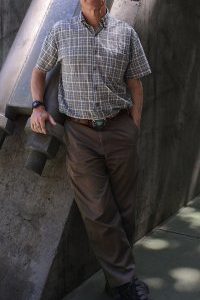Nick Mamatas: Webs
Nikolaus Mamatas was born February 20, 1972 in Port Jefferson NY, and grew up in Brooklyn. He attended SUNY Stony Brook (now Stony Brook University), earning a degree in multidisciplinary studies, then went to grad school at New School for Social Research (now New School University) for an MA in Media Studies. In 2008 he received an MFA in professional writing from Western Connecticut State University. He has worked as a gaffer on industrial films and a few independent features, and as a freelance writer, publishing articles and reviews in the Village Voice and other publications, and was co-editor and translator (with Kap Su Seol) of the non-fiction book Kwangju Diary: Beyond Death, Beyond the Darkness of the Age (1999), about the Kwangju Uprising against the military dictatorship of Chun Doo-hwan in South Korea in 1980. He is currently tradebooks editor for VIZ Media – ‘‘I do the books that are not manga’’ – where he runs the Haikasoru imprint, specializing in publishing Japanese SF in English translation. He was nominated for a Hugo Award for best long-form editor in 2011.
Mamatas began publishing genre work with a short story in Talebones, followed quickly by the Stoker Award-nominated horror novella Northern Gothic (2001). Story ‘‘The Dude Who Collected Lovecraft’’ (2008, with Tim Pratt) was also a Stoker nominee. Some of his more than 80 short stories were collected in 3000 MPH in Every Direction at Once: Stories and Essays (2003) and You Might Sleep… (2009). He has also published a poetry collection, Cthulhu Senryu (2006).
First novel Move Under Ground (2004) is ‘‘a Lovecraftian Beat road novel’’ from the point of view of Jack Kerouac and was nominated for the Stoker and International Horror Guild awards; The Damned Highway: Fear and Loathing in Arkham (2011, with Brian Keene) is about gonzo journalist Hunter S. Thompson encountering Lovecraftian entities. Other novels include Under My Roof: A Novel of Neighborhood Nuclear Superiority (2007), Sensation (2011), and the forthcoming Bullettime and The Last Weekend.
He has edited anthologies including The Urban Bizarre (2004), Realms and Realms 2 (2008 and 2009 with Sean Wallace), Spicy Slipstream Stories (2008, with Jay Lake), Stoker Award winner Haunted Legends (2010) with Ellen Datlow, and The Future Is Japanese (2012) with Masumi Washington. Mamatas was fiction editor at Clarkesworld from 2006-2008. He often teaches writing, and his book Starve Better (2011) is a practical guide to making a living as a writer. It was also a Stoker nominee.
Mamatas lives in Berkeley CA with his wife Olivia Flint, married 2011.
Website: Nick-Mamatas.com
Excerpts from the interview:
“I write nonrealistic fiction because that’s what I read as a kid. I read a lot of underground stuff. When I was in Brooklyn, my uncle (my mother’s brother) was living with us, sleeping on our couch and going to Manhattan, and he’d come back with this sort of punk-rock material: like crazy little fanzines, underground comics. I read all of those, semi-secretly. So my ‘DNA’ is all nonrealistic material, but not necessarily just science fiction and fantasy.
“Between Omni and classics by people like Ray Bradbury and the mainstream social SF satires and the underground material, I ended up reading this mix of nonrealistic, unrealistic, or surrealistic texts. And that’s how I write. That’s why people say my science fiction is not science fiction, my horror’s not horror, my fantasy is not fantastical.”
*
My novel Sensation is about parasitic manipulation: the idea that other species are controlling human minds and all of human history. In the real world, there’s a spider that is preyed upon by a wasp, and the wasp oviposits its eggs in the spider and compels the spider to create a different structure of web that can hold the pupating wasps as they emerge from the spider and consume its body. That relationship struck me as a metaphor for human behavior on several levels.
*
‘‘I’m interested in politics, especially radical politics. Though my stories are not especially about radical transformations, but about who decides to become a radical. And history is interesting. I like the orgasms of history: the revolutions, and those strange moments where things collapse centrally or are reborn. So again, revelation comes out. What does it mean to become a radical? You have some revelation, either theoretical or practical, that says, ‘This thing is broken all the way down to the root. I want to make a new one, and must pull the old one out by its roots.’ Those are very interesting and dramatic moments for your characters.”
*
‘‘As far as art and commerce, my point is: write for art’s sake, publish for commerce’s sake. There’s no reason to give something away if you can sell it – especially in short fiction, because there is room in short fiction for non-commercial (or anti-commercial) work, even if it’s only published as a novelty or as a break in the usual tedium, or to demonstrate that an editor is hip.
‘‘If publishers knew better, they’d be making money – they’re not making money. If the bookstores knew better, they wouldn’t have had 800 bookstores vanish in the last year. Clearly, they don’t know what they’re doing. So if nobody knows what’s going to be successful, you may as well do whatever you want. Only as long as you do what you want to be doing (because then you’ll be capable of doing it well) can you potentially have some success.’’









Pingback:May 27th Horror Quick Hits :: Hellnotes
Pingback:SF Tidbits for 5/28/12 - SF Signal – A Speculative Fiction Blog